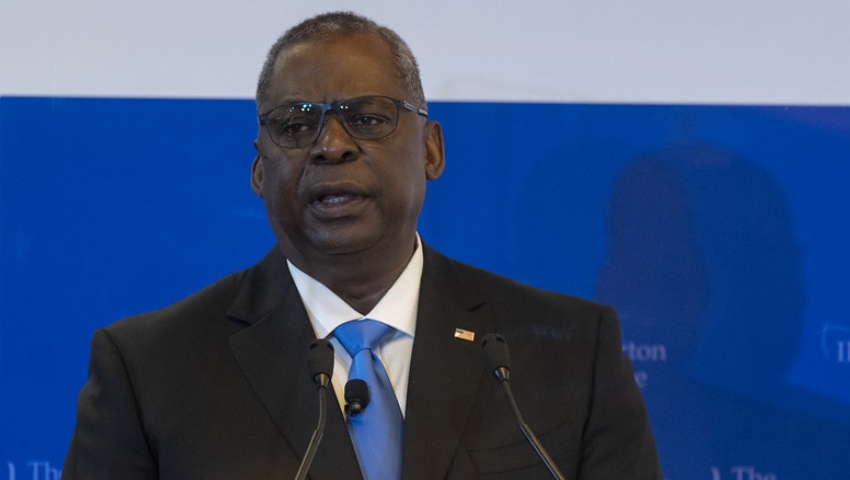US Secretary of Defense Lloyd Austin pledged to strengthen the nation’s security ties with allies in the Indo-Pacific to create a “stronger, more stable regional order” by promising to reinforce the US’ vaccine diplomacy, grey-zone warfare capabilities and deterrence factor in the Indo-Pacific.
Speaking to the 40th International Institute for Strategic Studies Fullerton Lecture in Singapore this week, US Secretary of Defense Lloyd Austin promised to uphold and strengthen the United States’ security ties with regional allies in order to preserve the rules-based order within the Indo-Pacific.
“You know, I learned a core lesson over four decades as a soldier, in peace and in war: Nobody can go it alone, at least not for very long. We are far stronger, and for far longer, when we come together than when we let ourselves be split apart,” Secretary Austin noted.
“Together with our friends, we face a range of challenges in this region that demand common action. There are transnational threats, like the pandemic and the existential threat of climate change… the spectre of coercion from rising powers… the nuclear dangers from North Korea… the struggles against repression inside countries such as Myanmar… and leaders who ignore the rule of law and abuse the basic rights and dignity that all people deserve.”
One of the US’ key priorities according to the speech was to preserve the healthcare and safety of Indo-Pacific nations amid the ongoing COVID-19 pandemic, and welcomed the opportunity to guarantee ongoing vaccine support “in the imperative of partnership”.
“So the United States has been rushing urgently needed assistance across the Indo-Pacific. That includes testing equipment, oxygen supplies, PPE, ventilators, and storage for vaccines,” Secretary Austin noted.
“And my team has been pushing hard to find other ways to help… including providing logistics support, establishing mobile clinics, and offering new military medicine training.
“But global recovery requires global vaccination. So we are rushing life-saving vaccine doses to the region. President Biden has committed to deliver more than 500 million shots worldwide over the next year, and the Indo-Pacific is a top priority. You know, in just the past two months, we have shared some 40 million doses throughout the region, including Indonesia, Laos, Malaysia, the Philippines, South Korea, Taiwan, Thailand, and Vietnam.”
While addressing the ongoing competition for vaccine diplomacy, the Secretary of Defense was quick to acknowledge the work that Australia has done in providing vaccines to regional neighbours.
The comments have came shortly after Beijing’s stark attack on Australia’s vaccine initiative, accusing Australia of undermining the credibility of China’s vaccines via “consultants” in the Indo-Pacific.
“Meanwhile, through the Quad’s vaccine initiative, India, Japan, Australia, and the United States have committed to producing and delivering a billion vaccine doses, right here in the Indo-Pacific,” Secretary Austin noted.
The Secretary of Defense also reiterated the country’s commitment to ensuring that deterrence remains a critical foundation of US foreign policy, promising the support of the Department of Defense to US diplomats to ensure that no large-scale conflict emerges.
This deterrence includes all conventional and non-conventional means of warfare that form modern grey-zone conflict, in what the Secretary Austin terms “integrated deterrence”. To build this integrated deterrence, the US has pledged to improve their cyber and space capabilities alongside those of their regional allies.
“Integrated deterrence also means working with partners to deter coercion and aggression across the spectrum of conflict… including in the so-called 'grey zone' where the rights and livelihoods of the people of south-east Asia are coming under stress. That’s why we’re working to strengthen local capacity and to bolster maritime-domain awareness, so that nations can better protect their sovereignty… as well as the fishing rights and the energy resources afforded them by international law,” he noted.
Such examples of the US supporting local capability building according to the speech include a new US-Singapore cyber defence strategy as well as US-Japanese space sensors for improved intelligence, surveillance and reconnaissance (ISR) capabilities.
Beyond the emerging cyber and space domains, Austin also welcomed the opportunity to strengthen the warfighting equipment of the US’ regional allies including approving the sale of the F-35 Joint Strike Fighter to Singapore, as well as strengthening the interoperability of the US and regional allies via large scale military exercises.
“Meanwhile, we’re improving interoperability across our security network. And that includes more complex exercises and training. In Japan, for example, we recently wrapped up an ambitious, large-scale exercise… in which US and Japanese forces together conducted the first successful firing of a High Mobility Artillery Rocket System in Japan,” Secretary Austin said.
“And we recently held the exercises known as Pacific Vanguard and Talisman Sabre off the coast of Australia, together with Japan, Australia, and the Republic of Korea. That underscored our ability to carry out integrated, high-end maritime operations with our allies.”
These multi-lateral exercises have coincided with the arrival of the UK’s aircraft carrier the HMS Queen Elizabeth, which carries US Marine Corps F-35s, demonstrating an international commitment by western democracies to preserve order in the region.
It is hoped that these signals of the US’ enduring dominance in the Indo-Pacific will ensure the ongoing security and stability of the Indo-Pacific.
“Our strategic partnerships can carry us all closer to the historic common project of a free and open Pacific, at peace with itself and with the world… a stronger, more stable regional order where countries resolve disputes amicably and uphold all the rights of all their citizens,” Secretary Austin noted.
“To bring that day closer, we are working through old alliances, and through new partnerships, and through regional and multilateral channels — from ASEAN to the Quad to the UN Security Council.”
Get involved with the discussion and let us know your thoughts on Australia’s future role and position in the Indo-Pacific region and what you would like to see from Australia's political leaders in terms of partisan and bipartisan agenda setting in the comments section below, or get in touch with



